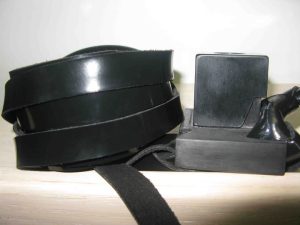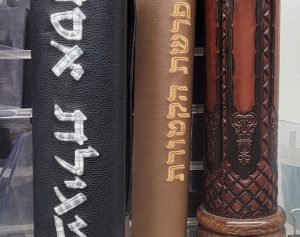How can it be that someone walks into a Judaica store, purchases a mezuzah for $30 or a set of tefillin for $250, and after a few years when he gets them checked, the sofer tells him that they were never kosher?
Not only does this happen, but it is common. This article will explain how this is possible and what you should do to insure that the tefillin and mezuzos which you purchase are kosher. The world of safrus has three groups. The first group consists of responsible soferim producing and selling various quality levels of kosher tefillin and mezuzos. Soferim in this group have extensively studied the complex halachos of hilchos STaM, been tested, and received smicha. The second group consists of people involved in the production of inferior tefillin and mezuzos that are relying on various leniencies in order to be considered kosher. It is unlikely that individuals in this category have an in depth understanding of the halachos and they were probably not tested for smicha. The third group consists of people who are not soferim and yet they are involved in the production and sales of inferior tefillin and mezuzos. It is possible and has even been documented that people who are not even Jewish participate in this deception. Everything they write is invalid. Even if they write something which appears to be kosher, it is in fact not kosher (many poskim invalidate tefillin, and mezuzos that were properly written but the writer did not have smicha. How much more so would they invalidate tefillin and mezuzos that are filled with improperly written letters? Even if there is a basis to be lenient in a well written mezuzah that has a letter that is problematic but not posel, they would never be lenient when it is clear that the writer was not concerned with properly writing the tefillin or mezuzah.
I often see mezuzos that are in this category and yet I can’t find a clearly problematic letter that I can show my customer and say, “Mrs Customer, this mezuza is invalid because this letter is posel and there is no halachic authority who will permit it to be used.” Nonetheless, I know (and every competent, certified sofer will wholeheartedly agree) that it is posel (invalid and unusable). Halacha is not built on collecting random lenient opinions in order to achieve a particular outcome. It is the job of the sofer, along with competent rabbanim to know what is normative halacha, and when circumstances allow for minor deviations. The goal of this article is to clarify some important issues relating to inferior tefillin and mezuzos, both those of low quality and those that are completely posel.
Most specifically, it is to make clear that even in the absence of a clearly posel letter, customers should be open to replacing tefillin and mezuzos that qualified soferim know were not written according to Jewish law and custom.






